Ten presidential candidates, led by Sen. Elizabeth Warren, will converge on the debate stage on Wednesday on the first night of Democratic debates to offer their pitches to voters and attempt a breakout moment for their campaigns.
For many of the White House hopefuls, it will be the highest-profile opportunity yet to offer their vision for the country and, if for just two hours, chip into a political news cycle often dominated by President Donald Trump. Given the massive field , the debate will be split over two nights , with 10 other candidates — including former Vice President Joe Biden and Vermont Sen. Bernie Sanders — appearing Thursday.
But on opening night, Warren will take center stage. The Massachusetts senator's constant stream of policy proposals has helped her campaign gain ground. Strategists say that Warren, widely viewed as a talented debater, is well positioned to showcase her strengths.
"I don't think anyone else on that night has her level of skill and her level of experience in this format," said Maria Cardona, a Democratic strategist. "I think she should look at this as an opportunity to really shine and come out of the first night as the one that is dominating the conversation."
Yet Warren could still face challenges. The other candidates on stage Wednesday aren't as well known and could use the moment to take aggressive stances against Warren in an effort to find a breakout moment.
"She's liable to have a target on her back and a lot of people potentially coming after her on that stage," said Charles Chamberlain, the chairman of the progressive political action committee Democracy for America. "But on the other hand, that will let people see how she handles attacks and can fend them off."
Asked whether she felt the pressure of effectively being the front-runner during the first debate, Warren shrugged off her center-stage position.
"This is just a chance to be able to talk to people all across this country about how this government works better and better and better for a thinner and thinner slice at the top, and it's just not working for the rest of America, she told reporters after her Tuesday rally in Miami. "2020's our chance to change that.""
Beyond Warren, the candidates who will debate on Wednesday are Sens. Cory Booker of New Jersey and Amy Klobuchar of Minnesota, Reps. Tulsi Gabbard of Hawaii and Tim Ryan of Ohio and former Reps. Beto O'Rourke of Texas and John Delaney of Maryland, along with Washington Gov. Jay Inslee, New York Mayor Bill de Blasio and ex-Obama housing secretary Julián Castro.
One split that could emerge Wednesday centers on "Medicare for All," the single-payer health plan introduced by Sanders and supported by Warren and others. But some candidates are not fully on board, preferring more incremental reforms. Delaney has been especially vocal in his criticism.
With so many White House hopefuls on stage, it could be difficult to dive too deep on any given issue. NBC News, which is hosting the debate, said candidates will have 60 seconds to answer questions and 30 seconds for follow-ups. They will be allowed closing statements but no openers.
All the candidates are competing ahead of a major fundraising deadline that will have lasting implications. The end of the second fundraising quarter on Sunday gives candidates a chance to make a splash with strong numbers ahead of the mid-July deadline to report that information to the Federal Election Commission.
A strong debate performance could fuel more donations, which is critical to the candidates' ability to participate in future debates. The Democratic National Committee is enforcing more stringent requirements for participating in the presidential primary debates this fall, so candidates who are struggling to gain a foothold may not have another similar opportunity on a nationally televised stage unless they are able to significantly boost their standing in the polls and fundraising numbers.
"For some of them, this might be their best opportunity to land a blow," said Joel Payne, a Democratic strategist.
The debate will unfold as many Democratic voters are just beginning to tune in.
Only 35% of registered Democrats say they're paying close attention to the campaign, according to a new poll from The Associated Press-NORC Center for Public Affairs Research. Two-thirds say they're paying some or no attention.
"People may have heard (the candidates') names, but they couldn't pick them out and don't know much about them," said Jesse Ferguson, a veteran Democratic strategist. "None of them are going to seal the deal in the first debate, but they need to get people interested enough to want to learn more.
The debate's second night on Thursday features more of the leading Democrats in the race. Biden will stand at center stage with Sanders at his left and Mayor Pete Buttigieg of South Bend, Indiana, at his right. The former vice president has come under fire from fellow Democrats after recently recalling that the Senate was once a more civil place, pointing to his work with two segregationist former senators.
Several of the candidates went to Florida early to raise money or court voters in the critical battleground state. Buttigieg held two Florida fundraisers on Monday night and stayed in Florida for debate prep. Warren, meanwhile, was in the state Tuesday to campaign for her new proposal to boost election security .
Not to be outdone, Vice President Mike Pence was also in Miami on Tuesday to launch "Latinos for Trump" as part of an effort to engage Latino voters for 2020. The Trump campaign said it was running ads in Wednesday's Miami Herald and El Nuevo Herald touting the president's achievements on behalf of Latinos.
Associated Press writers Sara Burnett in Chicago, David Bauder in New York, Alexandra Jaffe in Miami and Elana Schor in Washington contributed to this report.
SEOUL, South Korea (AP) — The United States and its allies are discussing options “both inside and outside the U.N. system” to create a new mechanism for monitoring North Korea over its nuclear weapons program, the American ambassador to the United Nations said Wednesday.
Russia last month vetoed a U.N. resolution in a move that effectively abolished monitoring by U.N. experts of Security Council sanctions against North Korea, which prompted Western accusations that Moscow was acting to shield its arms purchases from North Korea to fuel its war in Ukraine.
“I look forward to engaging with both the Republic of Korea and Japan, but like-minded (countries) as well, on trying to develop options both inside the U.N. as well as outside the U.N. The point here is that we cannot allow the work that the panel of experts were doing to lapse,” U.S. Ambassador Linda Thomas-Greenfield told a news conference in Seoul, using the formal name for South Korea.
Thomas-Greenfield didn’t provide specific details about U.S. discussions with allies and other partners, including whether an alternative monitoring regime would more likely be established through the U.N. General Assembly or with an independent entity outside of the U.N.
Thomas-Greenfield met with South Korean Foreign Minister Cho Tae-yul on Monday and they discussed unspecified “next steps to ensure a continuation of independent and accurate reporting” of North Korea’s illicit weapons development activities, according to her office.
Thomas-Greenfield said it was clear that Russia and China, which abstained from voting on the U.N. resolution vetoed by Moscow, will continue to try to block international efforts to maintain monitoring of U.N. sanctions against North Korea. She criticized Russia for violating those sanctions with its alleged arms purchases from North Korea, and China for protecting the North from being held accountable.
Moscow and Beijing have thwarted U.S.-led efforts to tighten U.N. sanctions on North Korea over its ramped-up ballistic missile testing since 2022, underscoring a divide between permanent Security Council members that deepened over Russia’s war on Ukraine.
“I don’t expect that they will cooperate or agree with any efforts that we make to find another path, but that is not going to stop us from finding that path moving forward,” Thomas-Greenfield said.
Thomas-Greenfield also briefly addressed questions about tensions in the Middle East. When asked about the Palestinian Authority's request to have full U.N. membership, she said a U.N resolution in support of that request would not contribute to finding a two-state solution to the Israeli-Palestinian conflict.
“President Biden has said categorically that we support a two-state solution for addressing the situation in the Middle East, where Palestinians will have a state of their own and Israel is secure in their state, and we are working on the ground to get to that place as quickly as possible,” she said.
“We do not see that doing a resolution in the Security Council will necessarily get us to a place where we can find a ... two-state solution moving forward," she added.
Tensions on the Korean Peninsula are at their highest point in years, as North Korean leader Kim Jong Un has accelerated his weapons demonstrations and issued provocative threats of nuclear conflict against rivals.
The United States, South Korea and Japan have responded by expanding their combined military exercises and sharpening their nuclear deterrence strategies built around strategic U.S. assets.
In a telephone conversation on Wednesday, South Korean President Yoon Suk Yeol and Japanese Prime Minister Fumio Kishida agreed to further strengthen three-way cooperation with Washington to counter North Korean threats and other regional challenges amid “deepening uncertainties in the international situation,” Yoon’s office said.
The Security Council imposed sanctions after North Korea’s first nuclear test explosion in 2006 and tightened them over the years in a total of 10 resolutions seeking — so far unsuccessfully — to cut funds and curb its nuclear and missile programs. The last sanctions resolution was adopted by the council in December 2017.
The Security Council established a committee to monitor sanctions, and the mandate for its panel of experts to investigate violations had been renewed for 14 years until last month.
Russia’s U.N. Ambassador Vassily Nebenzia told the Security Council before last month’s vote that Western nations are trying to “strangle” North Korea and that sanctions are losing their “relevance” in preventing the proliferation of nuclear weapons in the North.
In its most recent report circulated last month, the panel of experts said it is investigating 58 suspected North Korean cyberattacks between 2017 and 2023 valued at approximately $3 billion, with the money reportedly being used to help fund its weapons development.
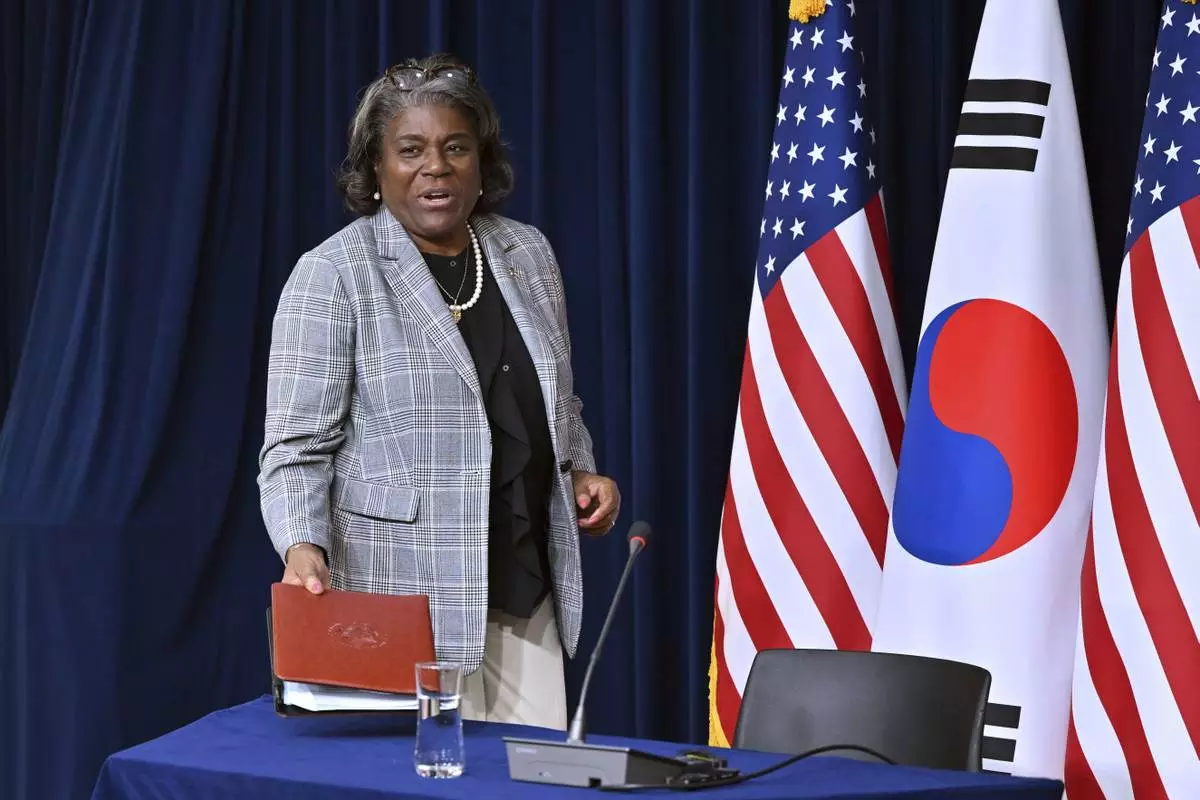
U.S. Ambassador to the United Nations Linda Thomas-Greenfield arrives to attend a press conference at the American Diplomacy House in Seoul Wednesday, April 17, 2024. (Jung Yeon-je/Pool Photo via AP)
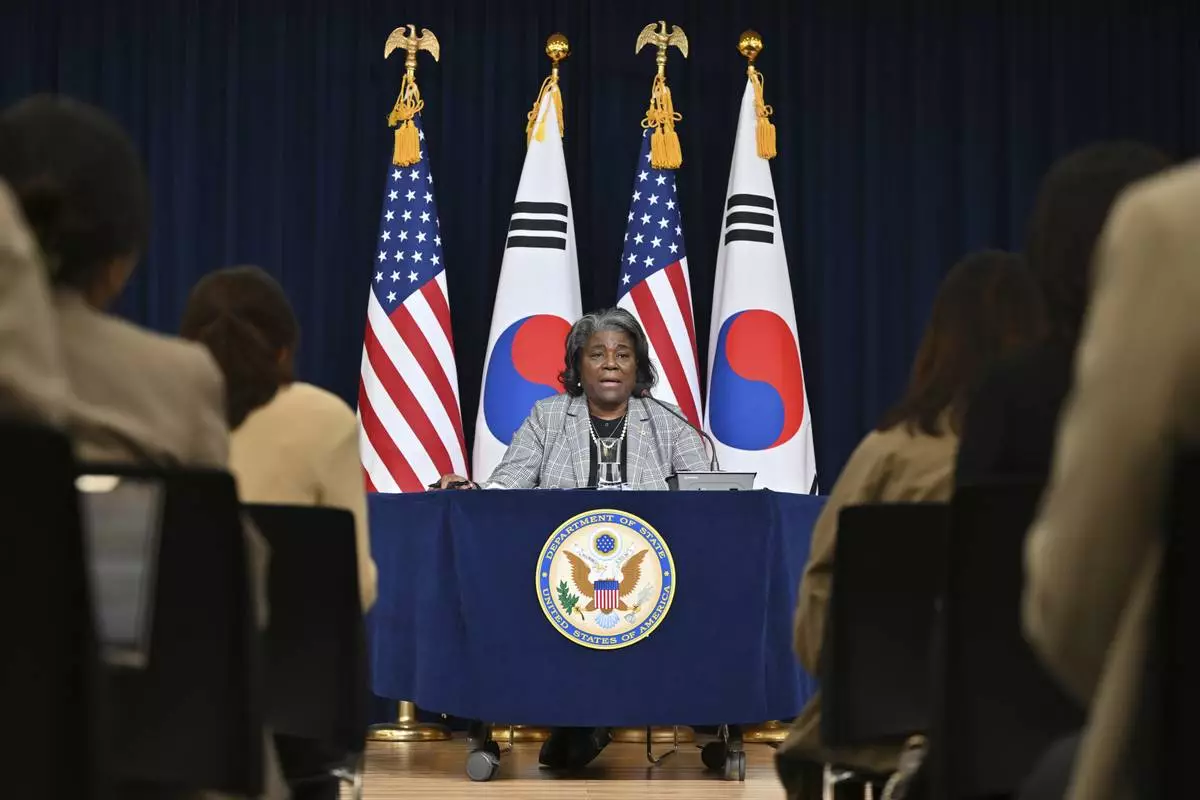
U.S. Ambassador to the United Nations Linda Thomas-Greenfield speaks during a press conference at the American Diplomacy House in Seoul Wednesday, April 17, 2024. (Jung Yeon-je/Pool Photo via AP)
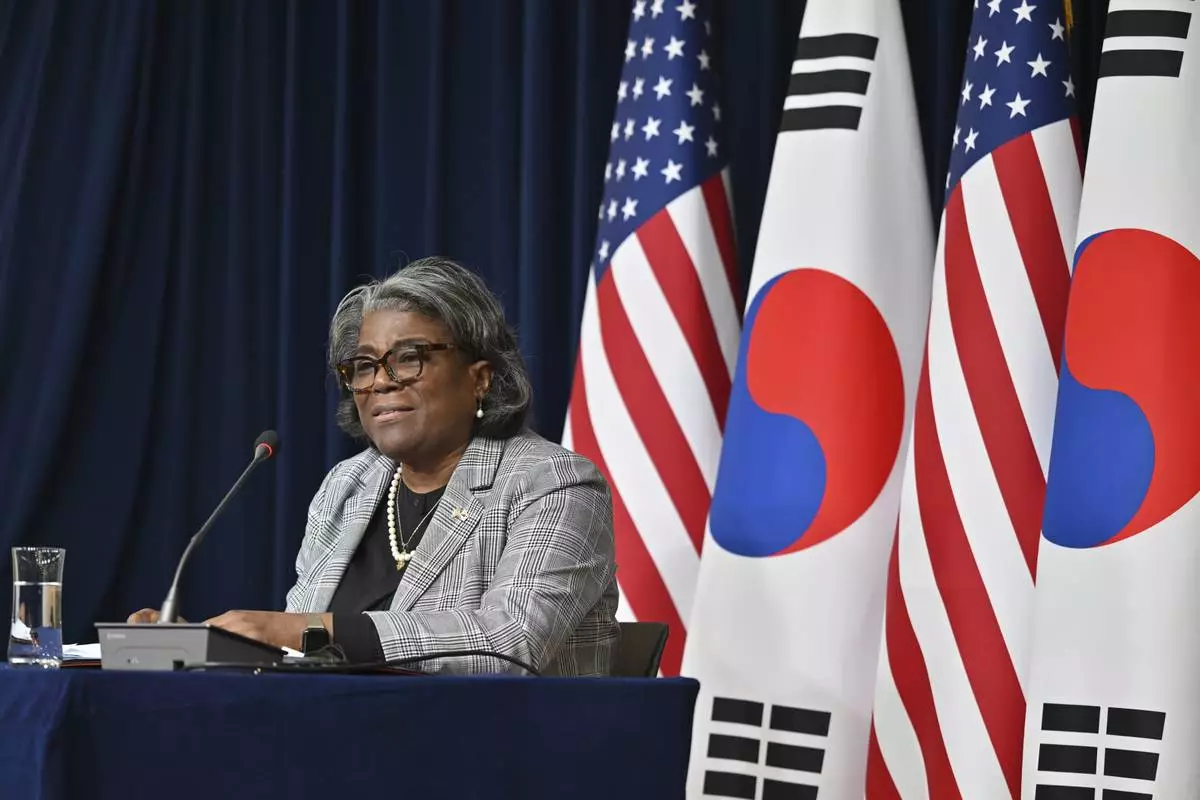
U.S. Ambassador to the United Nations Linda Thomas-Greenfield speaks during a press conference at the American Diplomacy House in Seoul Wednesday, April 17, 2024. (Jung Yeon-je/Pool Photo via AP)
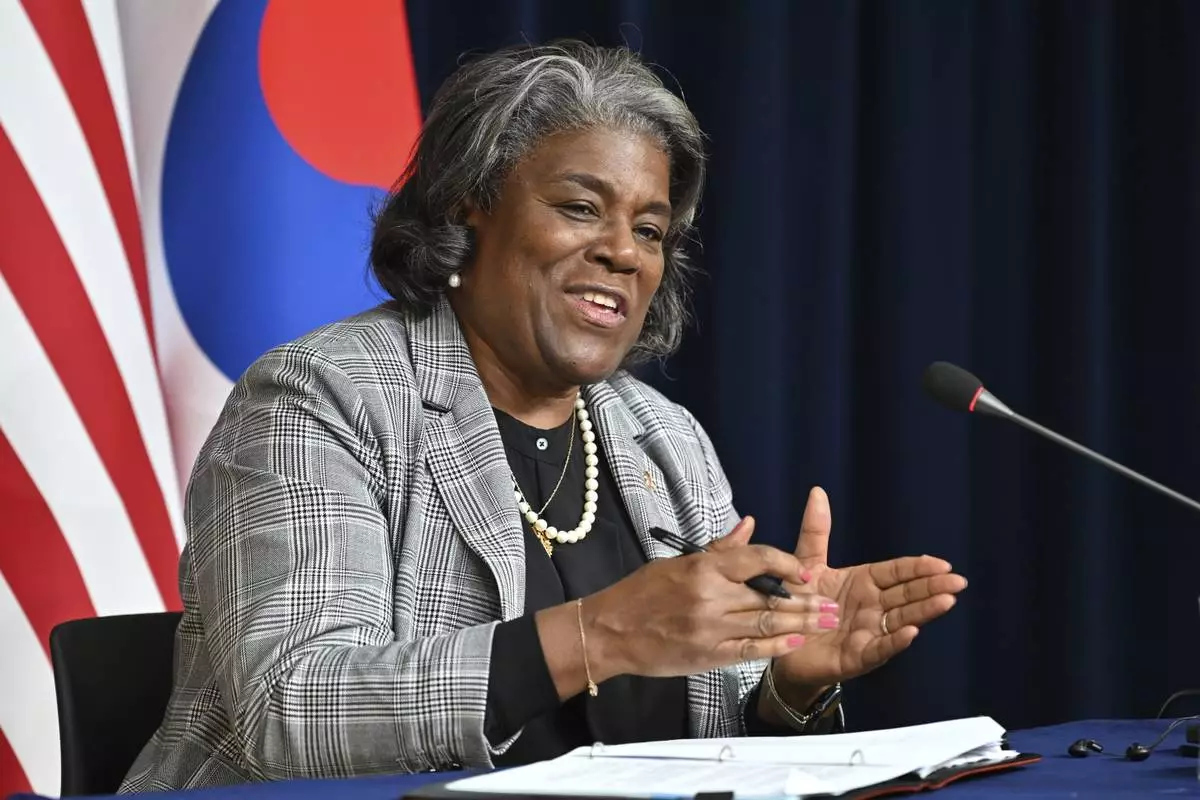
U.S. Ambassador to the United Nations Linda Thomas-Greenfield speaks during a press conference at the American Diplomacy House in Seoul Wednesday, April 17, 2024. (Jung Yeon-je/Pool Photo via AP)
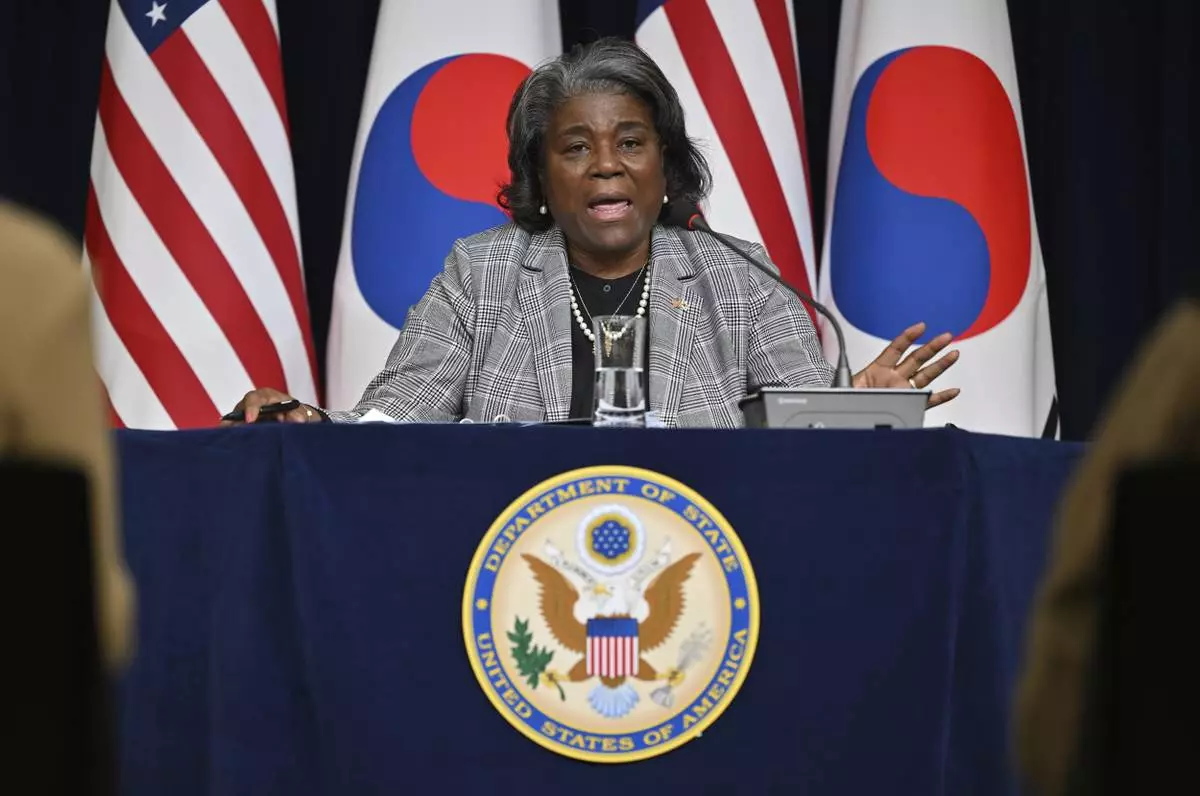
U.S. Ambassador to the United Nations Linda Thomas-Greenfield speaks during a press conference at the American Diplomacy House in Seoul Wednesday, April 17, 2024. (Jung Yeon-je/Pool Photo via AP)
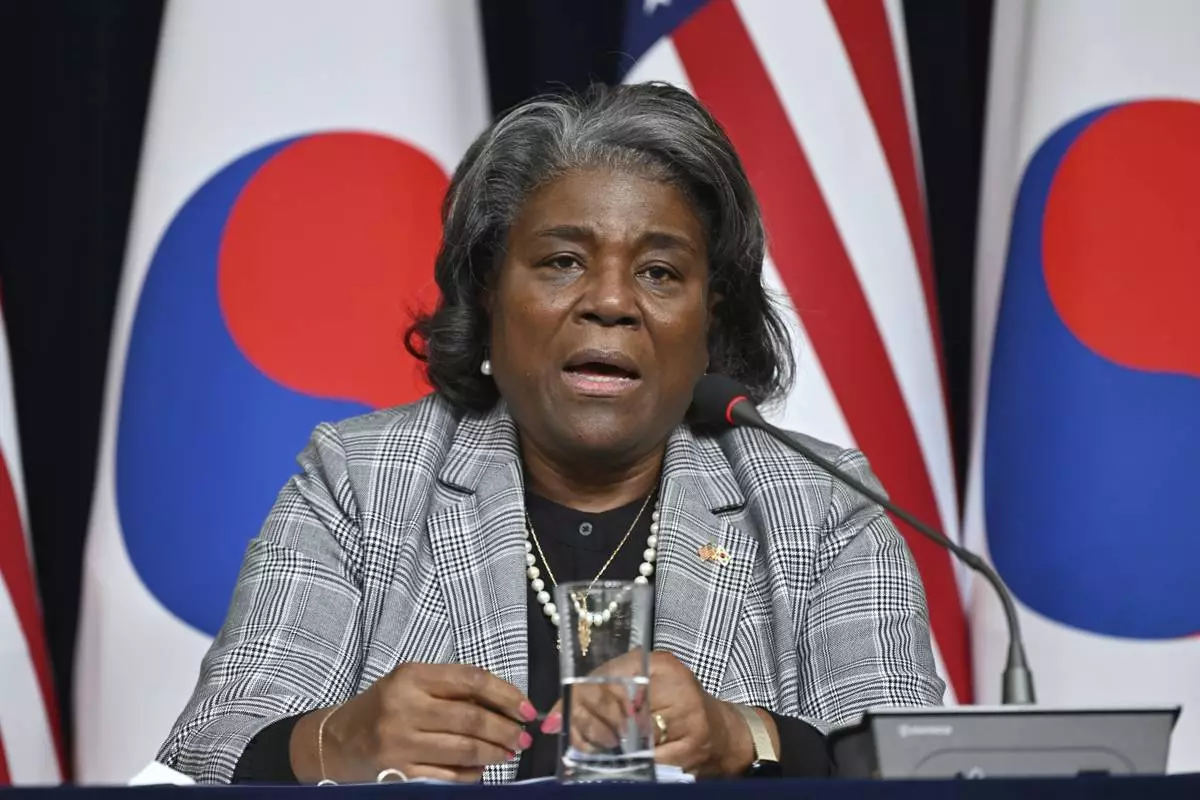
U.S. Ambassador to the United Nations Linda Thomas-Greenfield speaks during a press conference at the American Diplomacy House in Seoul Wednesday, April 17, 2024. (Jung Yeon-je/Pool Photo via AP)















